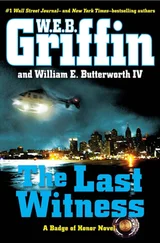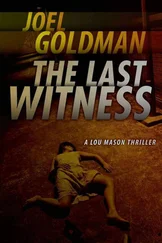John Matthews - The Last Witness
Здесь есть возможность читать онлайн «John Matthews - The Last Witness» весь текст электронной книги совершенно бесплатно (целиком полную версию без сокращений). В некоторых случаях можно слушать аудио, скачать через торрент в формате fb2 и присутствует краткое содержание. Жанр: Триллер, на английском языке. Описание произведения, (предисловие) а так же отзывы посетителей доступны на портале библиотеки ЛибКат.
- Название:The Last Witness
- Автор:
- Жанр:
- Год:неизвестен
- ISBN:нет данных
- Рейтинг книги:5 / 5. Голосов: 1
-
Избранное:Добавить в избранное
- Отзывы:
-
Ваша оценка:
- 100
- 1
- 2
- 3
- 4
- 5
The Last Witness: краткое содержание, описание и аннотация
Предлагаем к чтению аннотацию, описание, краткое содержание или предисловие (зависит от того, что написал сам автор книги «The Last Witness»). Если вы не нашли необходимую информацию о книге — напишите в комментариях, мы постараемся отыскать её.
The Last Witness — читать онлайн бесплатно полную книгу (весь текст) целиком
Ниже представлен текст книги, разбитый по страницам. Система сохранения места последней прочитанной страницы, позволяет с удобством читать онлайн бесплатно книгу «The Last Witness», без необходимости каждый раз заново искать на чём Вы остановились. Поставьте закладку, и сможете в любой момент перейти на страницу, на которой закончили чтение.
Интервал:
Закладка:
A few seconds’ silence with only the faint static line hiss, then Gordon asked. ‘When are you heading back?’
‘I’m not sure yet. I’ll call you later today when I know.’ She’d decide after she’d spoken to Nadine Moore whether to fly back straightaway or wait out the five days left of her trip. ‘And Gordon, I…’
‘Yes?’
‘It’s okay.’ She bit lightly at her bottom lip. ‘It doesn’t matter. I’ll see you soon, anyway.’ It just didn’t feel right pouring out her heart over this faint, static charged line; even though the distance, not having to face him, might have made it easier. And perhaps when she got home, having harboured the secret now for so many years, it still wouldn’t feel right.
Signing off, Elena found that she was trembling. She knew now why she’d so readily clung to rationalisation, and it had little to do with refusing to accept the worst after everything Lorena had already been through in her troubled past. It had to do with her own past — the wall of lies she’d so carefully constructed throughout her life, to Gordon and everyone else, but most importantly to herself. What lay at the core of their adopting Christos and Katine and her decision to work with strife-torn, orphaned children. She’d feared from the outset the gap in her psyche that this incident with Lorena threatened to open up, and part of her, despite her raw instincts, had tried to push it away. Now, having to face it square on, meant admitting that the founding principals of half her life had been wrong. There was nothing left to stop the wall crumbling.
FIVE
One single incident now threatening so much. Practically everything he’d planned and worked towards these past five years. It hardly seemed believable. Jean-Paul Lacaille shook his head as her looked through the long French windows towards the courtyard. The windows were almost twice his height, in keeping with the spacious, high-ceilinged room: one of four sets along its thirty-eight foot length.
At the room’s centre was a long refractory table with fourteen Louis XIV chairs surrounding. The ‘power room’ where practically every key decision of the Lacaille family had been made over the past three decades.
When his father had bought the house in ‘65, the courtyard had been enclosed only on three sides, with views over a formal Italianate garden on the fourth. But with their growing family — three generations of Lacailles under one roof at the same time — increasing workload at home, and finally the addition of a stableblock and gym, his and Roman’s respective play areas — ten years ago they’d built on the fourth wing in the same style to enclose the courtyard. As Roman keenly pointed out, the addition had also done much to improve security: there was no longer open access to the ‘power room’, and at the time of their battles with the Cacchione’s six years ago, Jean-Paul had moved his bedroom to the back of the house. But none of their precautions were to help save Pascal; he’d been the last they’d thought Cacchione would target.
The house had originally been built in the 1920s by a timber and minerals baron, a small scale Versailles Palace to properly reflect his new-found wealth and status. His father’s route to its grand portals had started with cigarette and contraband smuggling during the 2 ndWorld War off the Tyrrhenian Coast of Corsica. A rival Union Corse member gained territorial advantage by paying heavier bribes to his local Bastia mayor, and his father felt it was time to move on. He arrived in Montreal in March, 1953. The city was wide open then, ripe for docks and construction union racketeering. Numbers, clubs, loan-sharking and prostitution followed. With hedged construction bids, his father had earned millions out of the ’64 Olympics alone. Then soon after came narcotics.
Like so many old-school Mafioso and Union Corse, his father initially tried to steer clear of narcotics, considering it a dirty, dishonourable enterprise; but in the end the profits were too large to ignore. By the early 70s, the Lacaille family were one of Canada’s largest drug suppliers, second only to the Toronto-based Cacchione family.
Relationships with old-man Arnaldo Cacchione were reasonable, at least not too strained: violence was minimal, usually metered out to those who broke the rules from within their respective camps, or the rising number of small outside gangs trying to muscle in on their territory. But when young Gianni Cacchione took over the reins, things changed: he was ambitious, territorially aggressive, and a showdown with the Cacchione’s became inevitable. A couple of minor soldiers were lost on each side, then a Cacchione family cousin, before finally the retaliatory hit on Pascal.
Quiet, unassuming Pascal. Always playing backgammon or playing jazz guitar, or with his nose in a book — if not the company’s accounts then anything from a Victor Hugo classic to the latest American hot seller — his tastes were wide and eclectic. If it weren’t for the family business, maybe he’d have had more time to establish his music career, his first and main passion. And of all of them, he’d had the least to do with the business, never got involved in the muscle or enforcement side, only its balance sheet. That was why probably Cacchione had targeted him: himself, Roman and his father — the most obvious targets — were guarded to the hilt. So they’d picked off Pascal on the side ‘as a message’.
The message worked. Nothing was ever the same from that day. His father lacked the stomach to fight on. Pascal had been his favourite, the baby of the family, and worse still he blamed Roman for the hit on the Cacchione cousin that had led to the retaliation with Pascal. Internal family wrangling was intense.
Watching his father’s clawing sorrow and increasing frailty over the following months was what finally steered Jean-Paul towards his momentous decision to try and move the family away from crime. In the lull, they’d lost the main advantage and the best territories to Cacchione in any case. They could make as much by being enterprising in other ways: the stock market, construction, more casinos and clubs. Roman was against the idea, but with still the shadow of a finger pointing at him over Pascal’s death, his protests weren’t forceful.
Jean-Paul gained the main support from family Consiglieri, Jon Larsen, who pointed out that to achieve their aim, they’d need a keen financial eye on board. Two months of head-hunting by Larsen, and the name Georges Donatiens was proposed: one of the youngest and hottest rising investment portfolio managers with Banque du Quebec. Donatiens had just turned in the best past year performance on pension fund portfolios: an impressive 34 %. But it took ten months of cat-and-mouse courting to finally get Donatiens aboard, by which time it was too late for his father.
Jean-Paul’s quest had by then become a burning ambition, with the final seal, by default, of it being practically a death-bed promise to his father: ‘I’ll clean this business from top to bottom, you’ll see. What happened with Pascal will never be allowed to happen again.’
But it had come from the heart. All he could picture in that moment was himself, twenty years on, mourning the death of his own son, Raphael, then only eleven. They had all the money in the world. Yet so much of their lives was spent looking over their shoulders and worrying about the safety and welfare of family. It was no way to live.
His father had smiled indulgently. ‘A noble quest, and one that hasn’t been achieved before, as far as I know. But you seem determined — I’m sure you will succeed.’ Marked contrast to his father’s previously aired doubts and concerns that as much as you might wish to escape the past, ‘The past will never allow you that escape.’
Читать дальшеИнтервал:
Закладка:
Похожие книги на «The Last Witness»
Представляем Вашему вниманию похожие книги на «The Last Witness» списком для выбора. Мы отобрали схожую по названию и смыслу литературу в надежде предоставить читателям больше вариантов отыскать новые, интересные, ещё непрочитанные произведения.
Обсуждение, отзывы о книге «The Last Witness» и просто собственные мнения читателей. Оставьте ваши комментарии, напишите, что Вы думаете о произведении, его смысле или главных героях. Укажите что конкретно понравилось, а что нет, и почему Вы так считаете.












